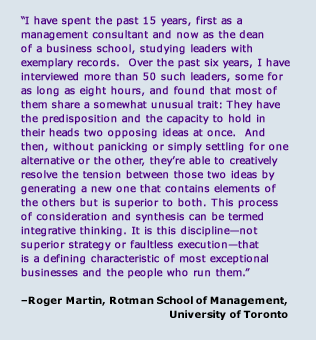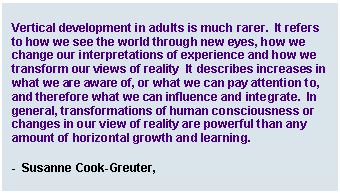|
 |
 |
|||||||||
|
 |
Executive Development Coaching : Creating Authentic Leaders | |||||||||
|
Looking for Competent Leaders
Over dinner, he discussed his frustration at not being able to find capable senior managers. As managers moved up the corporate ladder, they seemed to be unable to function at the level of responsibility, authority, and initiative their new positions required. This is not a new problem. “The Peter Principle,” a widely read book published in 1968, claimed that people rose to their level of incompetence in organizations. It is, however, getting significantly worse. In her article Getting More from Executive Coaching in the January 2007 issue of Harvard Management Update, Lauren Keller Johnson points to several factors increasing demands on managers: flatter organizations, changing workplace demographics, faster business cycles, and 24/7 information flow. As baby boomers start to retire, younger managers need to grow rapidly to take on their responsibilities in a much more complex and difficult environment. Key Elements of Leadership Corporations have responded to this problem by trying to improve the skill set of their employees through training and coaching. However, they generally find that skills improvement is, at best, a partial answer. The fundamental issue is the individual’s sense of who they are, their self-image, and consequent ways of thinking and feeling. There is now considerable research on the relationship of a person’s success as a leader or manager, and the way they think and feel about themselves and the world. In his article, How Successful Leaders Think in the Harvard Business Review, June 2007 issue, Roger Martin describes an “unusual trait” he found in successful leaders he calls “integrative thinking.” He argues that the normal focus on emulating “what a leader does is misplaced,” as actions that “work in one context often make little sense in another.” He suggests that “a more productive, though more difficult, approach is to focus on how a leader thinks - that is to examine the antecedent of doing, or the ways in which leaders’ cognitive processes produce their actions.” What Martin is calling “integrative thinking is actually an aspect of cognitive development, an expansion of our “normal” logical thinking into a more systemic way of making sense of the world called “dialectic thinking.”
In his best selling book, Good to Great: Why Some Companies Make the Leap.. and Others Don’t, Jim Collins describes the importance of leadership in the transformation of the 11 companies that made the jump to greatness. He calls their CEOs "Level Five" leaders. While Collins can only speculate as to what creates a Level Five Leader, Bill Torbert, a pioneer in applying development theory to leadership, relates the key qualities of such leaders to a specific, advanced developmental stage in his book Action Inquiry: The Secret of Timely and Transforming Leadership.
Leadership development thus involves facilitating the emergence of development stages appropriate for the client’s management level, so that they are able to be and express the mental and emotional capacity required for the job. A person’s capability fundamentally defines who they are, as distinct from skills they may currently have. This capability results in a frame of reference that underlies how a person thinks, feels, behaves and acts.
Developing Authentic Leaders
Developmental coaching works with the client’s capability, rather than just attempting to change their skills and behavior, the focus of most coaching and training. The process begins with a three part developmental assessment. Cognitive and social-emotional development profiles are assessed through semi-structured interviews, while behavioral strengths and weaknesses are identified through an instrument that measures the client’s perception of their fit in the organization in three key areas: self-conduct, task focus, and interpersonal perspective. While the coaching focuses on the problem areas identified by the client as well as by the behavioral instrument, the underlying intent is to use the specific issues to accelerate the client’s development process. Solutions to the issues are found by helping the client to think more systemically and fluidly, and to expand their ability to understand and relate to their own and other’s emotions. As the new ways of thinking and feeling are integrated, the client is able to realize and express more of their potential capability, and successfully handle higher levels of responsibility
More Information If you would like more information on our Executive Development Coaching program, please click on the links below: . |
|||||||||||
 |
 |
||||||||||
| Copyright ©2006 Sunil Ahuja. All rights reserved. | |||||||||||
 |
 |
Home | About Us | Workshops | Spirit in Life | Spirit at Work | Newsletter | Register| Register | Online Store | Calendar | Resources | Contact For questions about this site, please contact us. |
|||||||||







 Since Daniel Goleman published his book “Emotional Intelligence” in 1995, the relationship between emotional intelligence and business and life success has been extensively researched and widely accepted. In a 1998 Harvard Business Review article entitled “What Makes a Leader,” Goleman discusses five components of emotional intelligence crucial to effective leadership: self-awareness, self-management, motivation, empathy, and social skill. He does, however, see these components just as skills. In fact, they are also functions of an individual’s social-emotional development stage.
Since Daniel Goleman published his book “Emotional Intelligence” in 1995, the relationship between emotional intelligence and business and life success has been extensively researched and widely accepted. In a 1998 Harvard Business Review article entitled “What Makes a Leader,” Goleman discusses five components of emotional intelligence crucial to effective leadership: self-awareness, self-management, motivation, empathy, and social skill. He does, however, see these components just as skills. In fact, they are also functions of an individual’s social-emotional development stage.